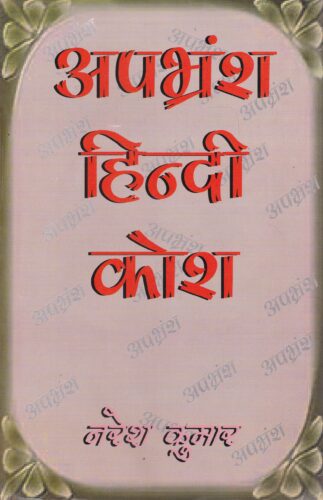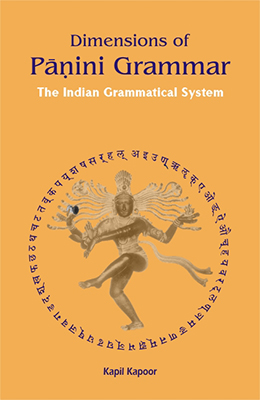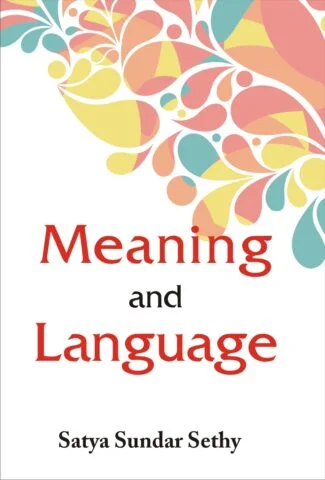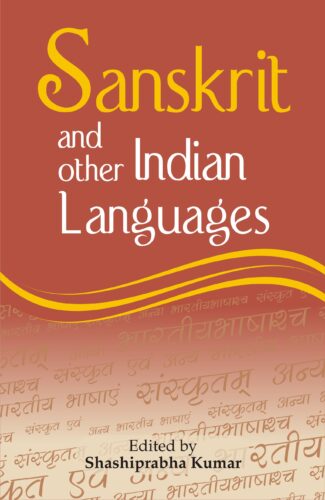

Apbharamsa Hindi Kos...
Apbharamsa Hindi Kosha
Apabhramsa-Hindi-Dictionary by: Naresh KumarThis Dictionary of Hindi Apabhramsa gives in detail the grammatical importance of words, their meanings, correct spellings, the alternate words and their various usages as mentioned by lexicographer Naresh Kumar.
₹1,500.00 Original price was: ₹1,500.00.₹1,350.00Current price is: ₹1,350.00.
ISBN: 9788124601365
Year Of Publication: 1999
Edition: 1st
Pages : xlv, 869
Language : Hindi
Binding : Hardcover
Publisher: D.K. Printworld Pvt. Ltd.
Size: 23 cm.
Weight: 1500
This Dictionary of Hindi Apabhramsa gives in detail the grammatical importance of words, their meanings, correct spellings, the alternate words and their various usages as mentioned by lexicographer Naresh Kumar.

- Sale!Dimensions of Panini Grammar by: Kapil Kapoor
₹950.00Original price was: ₹950.00.₹855.00Current price is: ₹855.00.Leonard Bloomfield described Panini’s Ashtadhyayi (7th century bc) as ‘one of the greatest monuments of human intelligence.’ It is a complete, explicit and comprehensive grammar of both spoken and textual (compositional) Sanskrit. Most of the reputed and renowned Indian and foreign universities running courses on Indian knowledge systems, study it for its principles of analysis, organization and description. What is of great interest is the theoretical framework that informs this grammar, a framework that has remarkable power to describe human languages, particularly the Indian languages.
Panini is the watershed in the linguistic history of India. Before Panini, there was extensive work in phonetics, in morphology and lexicon (in the patha tradition) and in nirvacana (etymology). There is evidence also of the existence of several schools of grammar. In what is characteristic of the Indian intellectual traditions, Panini distilled the available grammatical knowledge and put it in 32000 syllables — as if, it has been said, an ocean has been accommodated in a cow’s hoof-mark. After Panini, a whole tradition developed and produced rich works by Patanjali, Candrakirti, Jainendra, Bhartrihari, Bhojraja, Hemacandracarya, Bhattoji Dikshita, Nagesha Bhatta and many others. It also inspired work in literature and philosophy and has left its mark on the entire intellectual tradition. In the modern period, there is a spread of Ashtadhyayi studies round the globe and it has proved to be of great interest for the study of knowledge representation in the departments of system sciences.
A comprehensive study of the different dimensions of this wonderful grammar enlarges and alters the conceptual horizons of young minds and of all those who care to be associated with the Indian grammatical systems. This book is a record of that adventure. - Sale!Recent Researches in Sanskrit Computational Linguistics by: Malhar Kulkarni, Chaitali Dangarikar,
₹700.00Original price was: ₹700.00.₹630.00Current price is: ₹630.00.This volume is the proceedings of the 5th International Sanskrit Computational Linguistics Symposium (ISCLS), held at IIT Bombay during 4-6 January 2013. These proceedings include fourteen selected and three invited papers. The selected papers deal with topics such as computational modelling of Panini’s grammar Ashtadhyayi together with its supplementary texts, computational tools for Sanskrit language and their applications in the traditional Sanskrit concerns. Accordingly, this book delves upon how clues from Ashtadhyayi help in identifying compound types; how Ashtadhyayis digital edition can be structured and implemented; the completeness analysis of a Sanskrit reader; graph-based analysis of parallel passages; some relation-specific issues in parsing Sanskrit texts, text normalizer for Sanskrit; extended Nyaya-Vaisheshika ontology; and a search engine for Sanskrit, among others.
The invited papers focus on lexicography, with special reference to Encyclopaedic Dictionary of Sanskrit on Historical Principles; some aspects of semantics in early India in understanding the meaning of words; and the computational database of Paninis grammar.
This collection, thus, is an important initiative in the filed of Sanskrit computational linguistics as it records insightful current trends in the field, making it a must buy for students, researchers, and all those interested in Sanskrit grammar. - Sale!Meaning and Language by: Satya Sundar Sethy
₹600.00Original price was: ₹600.00.₹540.00Current price is: ₹540.00.This volume explores the nature of meaning and the way it functions in language. Philosophers such as Aristotle, Thomas Acquinas, John Locke, Immanuel Kant and David Hume had keen interest in the study of meaning, though it was not central to their philosophical inquiry. But the contemporary philosophy takes a radical twist towards language which is characterized as linguistic turn in philosophy. Meaning and its correct characterization are the foremost concerns of contemporary philosophy.
Study of two semantic perspectives meaning atomism and meaning holism is the core content of this book and it mainly focuses on contrasting these two perspectives or models of meaning and evaluates them with a view to arrive at an explicit conception of meaning that will correctly reveal the semantics of natural language.
In doing so, it vividly discusses the two perspectives of meaning along with the atomistic theory of Gottlob Frege, Wittgensteins approach to meaning, logical positivists conception of meaning, why meaning atomism fails to capture the uniqueness of meaning, Quinian theory of meaning holism, Davidsons approach to meaning holism, and Later Wittgensteins view on meaning holism, thus covering a wide gamut of the topic. - Sale!Philosophy of Language in Classical Indian Tradition by: K.S. Prasad
₹850.00Original price was: ₹850.00.₹765.00Current price is: ₹765.00.Philosophical query into the working of language has occupied an important place in the rich tradition of thought in India since the ancient times. This book throws light on various debates in classical Indian Philosophical tradition concerning the structure of language and meaning. Papers in this book have been arranged in four groups basing on their thematic composition. The book begins with the general issues relating to language as figured in classical schools of Indian philosophy. Papers dealing with the semantic structure of language as discussed by Bhartrhari in his Vakyapadiya follow this. The next set of papers is related to some of the important semantic notions of Nyaya philosophy of language. In this respect notions like sense, reference, proper names, meaning, etc., have figured in for discussion. The last set of papers is concerned with the import of sentences wherein papers dealing with Purva-Mimamsa are included. One of the significant features of this volume is that some of the issues and problems in Indian Philosophy of language have been approached from the contemporary Western perspective with a view to explicate and evaluate them in a better way and this would be of considerable interest to scholars and students of philosophy, particularly those involved in the study of classical Indian philosophy.
- Sale!Sanskrit and Other Indian Languages by: Shashi Prabha Kumar
₹440.00Original price was: ₹440.00.₹396.00Current price is: ₹396.00.This book is mainly a compilation of articles which were primarily presented at the Sanskrit Week Programme organized by the Special Centre for Sanskrit Studies, Jawaharlal Nehru University, New Delhi from 714 August 2006. A few articles have, however, been added later on. Sanskrit and Other Indian Languages features the influence and interaction of Sanskrit with Prakrit, Hindi Apabhramsha, Urdu, Bangla, Tamil, Telugu, Kannada, Malayalam, Assamese, Punjabi, Kashmiri and Gujarati. It covers various aspects of mutual reciprocation between Sanskrit and other Indian languages such as Þ conceptual, structural, grammatical, historical, linguistic, colloquial as well as literary. Issues of oral and written forms of language as also of textual translations have been dealt with by Sanskrit scholars who are well-versed in respective Indian languages. Finally, there is an article which argues for Sanskrit as a National Language of India. This book is a modest attempt to convey the inherent thought-pattern of Indian mind basically enshrined in Sanskrit but expressed through variety of verbal forms across the country.







